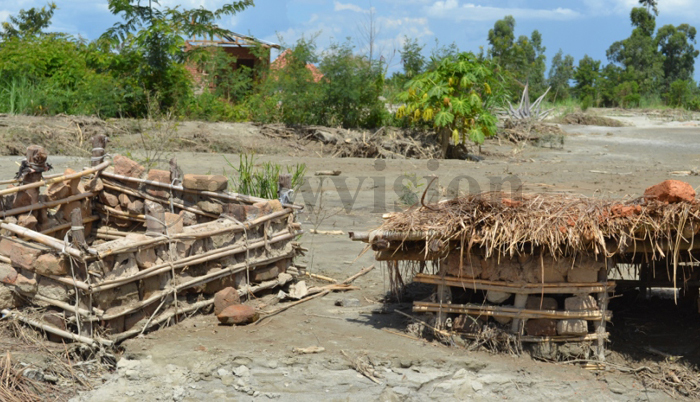Diarrhoea outbreak worries Kasese
Jul 30, 2020

As Kasese district grapples with the huge aftermath of floods and landslides that ravaged the area thrice last May, cases of diarrhoea have been reported in some areas in the district.
The most affected areas so far include Karusandara and Maliba in Busongora South and Busongora North constituencies where about 50 life-threatening cases have occurred.
Causes
The incidence has been attributed to the breakdown of the water and sanitation systems, especially the boreholes and pit latrines, which were destroyed and washed away when the rivers flooded and overran the areas.
According to the Kasese District Senior Planner, Joseph Singoma, at last, 112 public and private latrines and bath shelters were destroyed across the district.
Eighty-year old Margaret Biira of Karusandara sub-county says the disease was inevitable.
"We have resorted to fetching and drinking untreated water from the rivers and streams in the area following the destruction of the few boreholes," she said.
She added that diarrhoea could be resulting from poor human waste disposal because many people had resorted to defecating in the bushes.
"We defecate wherever is convenient for us because people like me are too weak to construct new pit latrines," she said at her home.
Agnes Sibaminya, another resident camped at Karusandara Seed Secondary School, Kivengenyi village, said the residents were also worried about other looming dangers including malaria and cholera as scores of people still live in the poorly maintained internally displaced people's camps.
"The water we drink is likely contaminated with fecal matter since the pit latrines were washed away into the water sources," she said.
Biira also notes that there were shortages of sanitary pads in the camps forcing the girls and women to use rags during their menstrual periods.
"Our daughters vulnerable to pregnancies as boys from the unaffected homes have started luring them into sexual relationships in exchange for material items," Biira said.
She said many girls were unlikely to return to school when the government re-opens schools after the COVID-19 lockdown.
Rinah Rita, a health worker at Karusandara Health Centre III, said efforts to sensitise the community against drinking untreated water were becoming fruitless, partly because of their mindsets and the high costs of boiling the water.
"Some of them have opted to stay away from the crowded camps where it is relatively easier to manage them and returned to their homes where it is hard to follow them up," she said.
Appeal
Everest Sserugendo, the Kivengenyi LC I chairperson, implored the district administration to intervene before lives are lost.
He said the water, which had devastated the area, was from rivers Mubuku, Nkoko, and Sebwe, which needs redirecting.

He asked the government to expedite the de-silting of the rivers and address the causes of the floods before forcing the displaced to return to their homes.
NGO decries fuel shortage
At a District Disaster Management Committee (DDMC) meeting held at Rwenzori International Hotel Tuesday, it was revealed that more the water-borne disease had infected 50 residents, epically those displaced and living in camps.
Laura Beutler, the Emergency Medical Services Technical Coordinator of the German-based Malteser International said there are more than 25 and 30 diarrhea cases in Karusandara and Maliba sub-counties respectively.
Stuck
She said her organisation was ready to supply clean water to the affected communities but was stuck because it lacked fuel for the water bowsers.
"In the last two weeks, there has been no fuel for the water bowsers to deliver water to the affected camps but also the neighbouring communities," Beutler said at the Save the Children-funded meeting.
"Some of the cases are life-threatening," she said at the meeting, which was chaired by Tadeo Muhindo, the Kyarumba Town Clerk who represented the Chief Administrative Officer (CAO).
However, the Foundation for Urban and Rural Development (FURA Executive Officer, Rauben Mbauta, implored those who provide relief food to the district to also add some fuel as part of their support.
"As a district, we cannot sustain this situation alone," said Mbauta, who is also in charge of the DDMC logistics.
In Kanyangeya Ward of Nyamwamba Division in Kasese Municipality, the authorities have condemned more than 100 buildings in Kanyangeya Cell, declared them unfit for human occupation.
They have directed their occupants to vacate because the area was flooded on May 7.
The buildings have since continued being surrounded and submerged by oozing underground water, which has caused the pit latrines that survived to sick and the water to remain stagnant, become a mosquito-breeding ground.
Joy Biira, a mother of four children says she does not know what to do next after her house was condemned.
Searching for permanent evacuation site
Tadeo Muhindo told the various stakeholders at the one-day meeting that the district was searching for a permanent evacuation centre to re-settle the displaced.
The meeting, which was lacking technical district officials who should have responded to the medical problem, resolved to relocate those displaced in Kanyangeya to Kogere Primary School playground within Kasese Municipality.
Muhindo revealed that the district head received additional equipment from the Works Ministry to de-silt the river beds to create permanent water passages and relieve the residents from hit again by floods during the recurrent rainy seasons.
